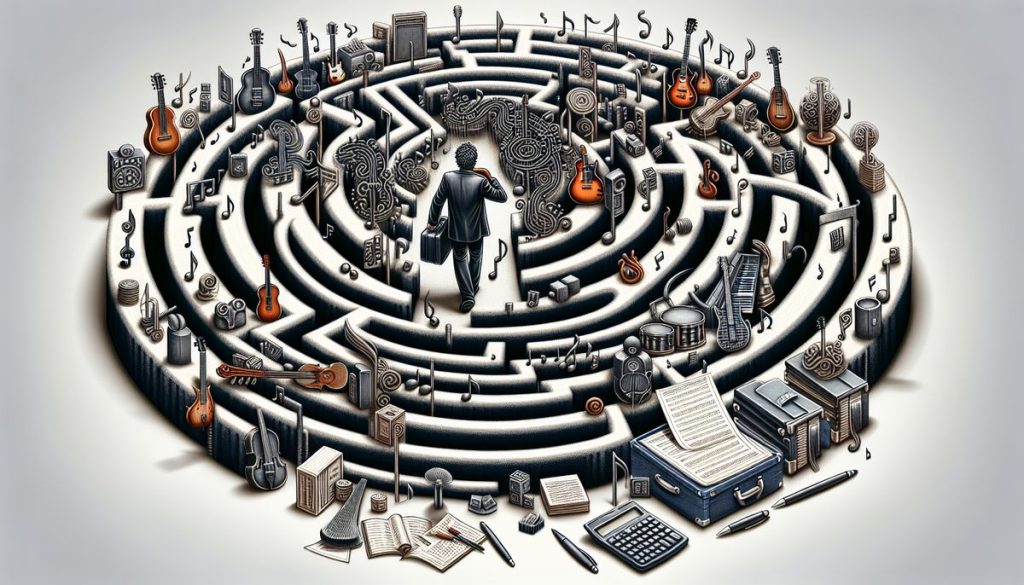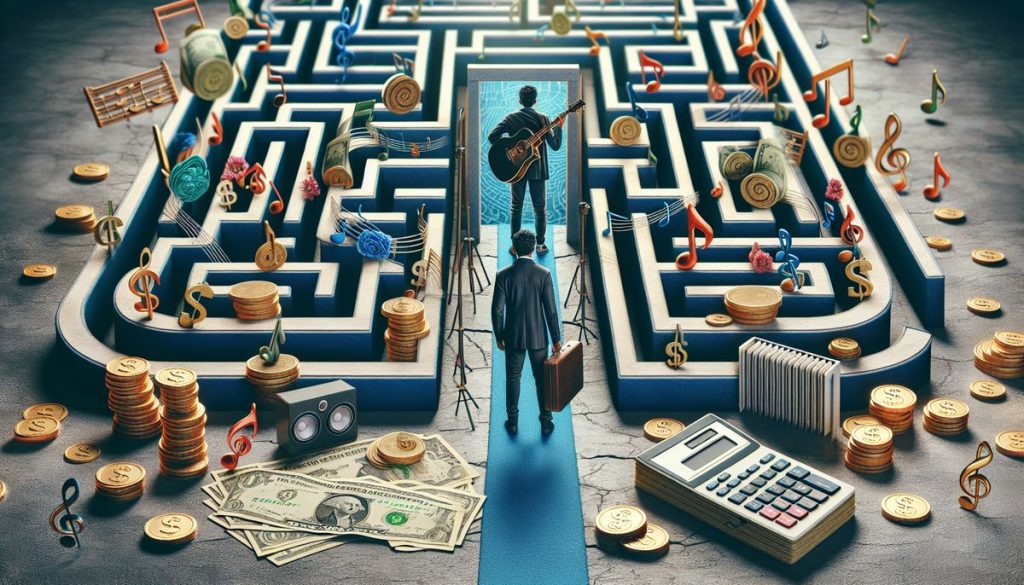Navigating the Beat: Understanding Copyright and Trademark Law in Today’s Music Industry
Written by DJ Prodigee on Tue Mar, 2024
In the modern music industry, understanding the legal intricacies of copyright and trademark law is as crucial as the creative process itself. For rising artists, grasping these concepts is key to protecting their work, building a brand, and ensuring fair monetization. This article delves into the depths of music law, from securing copyrights to leveraging trademarks, and from navigating contracts to adapting to the digital age’s challenges. We aim to provide a comprehensive guide for upcoming musicians to navigate the legal beats of today’s music landscape.
Key Takeaways
- Copyright law is essential for protecting original works, and while registration is not mandatory, it offers significant legal advantages, including statutory damages for willful infringement.
- Trademark law extends beyond logos to cover stage names, band names, and even hashtags, providing musicians with brand protection in various forms.
- Music contracts are complex and can have long-term career implications; understanding publishing deals and the nuances of contract law is crucial for artists.
- The internet offers vast opportunities for music distribution, but comes with its own set of legal challenges, such as licensing for internet radio and NFT considerations.
- Musicians must be aware of the broader legal landscape, including non-traditional trademarks and the impact of fashion, beauty, and esports law on their personal brand.
Who Owns That Sick Beat? The A-Z of Copyright in the Music Biz
What Can Be Copyrighted? The Sound of Legality
Ever wondered if that sick beat you just dropped is actually yours to keep? Well, let’s dive into the copyright pool and find out what floats. For a work to be copyrightable, it must be original and fixed in a tangible form. That means your tunes need to be more than just an earworm; they’ve got to be recorded somewhere, like on a CD, MP3, or even a WAV file if you’re feeling retro.
Here’s a quick rundown of what you can call your own in the music biz:
- The actual song recordings
- The lyrics (yes, even that catchy chorus)
- Underlying musical composition
- Music videos or other audio-visual works
- Photographs, logos, or other visual materials
- Unique textual information like a bio or website
Remember, copyright gives creators control over their work, but fair use is tricky and trademark protection is crucial. So, don’t just remix willy-nilly or slap your name on something without thinking it through!
And hey, if you’re still scratching your head over this, just know that every track has two sides to the copyright coin: the Sound Recording (SR) and the Musical Composition (PA). It’s like having twins; they’re related but have their own personalities and rights.
Why You Still Should Register A ‘Copyrighted’ Work
So you’ve just finished your latest banger, and you’re ready to drop it like it’s hot. But hold up! Before you unleash that earworm on the world, let’s chat about why you should still register that bad boy with the U.S. Copyright Office. It’s not just a formality; it’s your golden ticket to the Copyright Club.
First off, registering your work makes it a whole lot easier for folks to track you down for those sweet, sweet licensing deals. Want to sue someone for ripping off your masterpiece? You’ll need that registration slip to even start the legal tango. And if you register within three months of publication, you’re looking at potential statutory damages and attorney’s fees if you win. Cha-ching!
Benefits of registration start immediately and are retroactive to the original filing date. That’s like time travel for your legal rights! Here’s a quick rundown of what you get:
- Prima facie evidence of copyright ownership after five years
- The right to sue for infringement
- Eligibility for statutory damages and attorney’s fees
Remember, the magic of copyright doesn’t fully sparkle in the U.S. until you’ve got that official stamp of approval. So don’t just sit there; make it official and protect your tunes!
The Remix Riddle: Navigating Copyrights In Music Mashups
Ever tried to make a musical Frankenstein? That’s what remixing is like in the music biz. You take a snip here, a sound bite there, and voilà, you’ve got a brand spanking new track. But hold your horses, Dr. DJ, because navigating copyright and trademark law is no joke when you’re stitching together those beats.
Sampling is the heartbeat of the remix culture. It’s like a potluck dinner where everyone brings a dish, except you need permission to nibble on someone else’s casserole. Here’s the skinny: to legally use a sample, you gotta get a ‘sample clearance’ from the original rights holders. And guess what? There are two copyrights in every song—the sound recording and the song itself—so double the fun!
- Obtain permission from the record label for the sound recording.
- Get a nod from the publisher for the song’s composition.
Without the right clearances, your mashup could be a mash-down, with legal eagles swooping in for the kill.
Remember, kids, unlicensed sampling is like grabbing the electric guitar at a metal concert—it’s gonna get loud and not in a good way. So, before you drop that sick beat, make sure your legal ducks are in a row, or you might just find your remix on the wrong side of a lawsuit.
Name That Tune… And Protect It! Trademark Law for the Music Maestros
Trademark Law Protection for Musicians: More Than Just a Fancy Logo
So you’ve got a killer band name and your logo is so cool it makes hipsters weep with envy. But hold your horses, rockstar! Before you slap that bad boy on every t-shirt and coffee mug from here to Timbuktu, let’s chat about trademark law. Trademark law is crucial for musicians to protect band names, logos, and merchandise. It’s not just about looking snazzy; it’s about legally claiming your territory in the wild west of the music biz.
Imagine this: you’re on the brink of stardom, your band’s name is on everyone’s lips, and then BAM! Some cheeky cover band on the other side of the globe starts selling merch with your name on it. Not cool, right? That’s why you need to own your brand like you own that stage. Here’s a quick rundown on why trademarking is your new BFF:
- Protection: Keep those copycats at bay and ensure your fans are getting the real deal.
- Credibility: A registered trademark is like a VIP pass to the industry; it shows you mean business.
- Longevity: Trademarks are renewable forever, as long as you’re still using them. Talk about a long-term relationship!
Remember, everything you do is based on the "name" and making a change destroys what you have built.
So, whether you’re a solo act or part of a band that’s about to hit the big time, don’t play it by ear when it comes to your brand. Trademark it, and let the world know who’s boss of the beat.
Trademark Law Protection In A #Hashtag World
Welcome to the wild world of trademarks, where even a # can be your legal BFF. Hashtags have gone from trendy to trademarked, and if you’re not on the bandwagon, you’re missing out on some serious brand protection mojo. The U.S. Patent and Trademark Office (U.S.P.T.O.) has laid down the law: a hashtag can be more than just a pound sign; it’s a beacon for your brand in the digital sea.
But don’t just slap a # on anything and call it a day. To get that sweet, sweet trademark protection, your hashtag has to actually do something. It’s gotta work it, serving as a shiny identifier of your goods or services. Think of it as your brand’s digital fingerprint, unique and all yours.
Here’s the kicker: not all hashtags are created equal. To be trademark-worthy, your hashtag must be used in commerce, like a badge of honor on your ads or products. So, before you get too hashtag-happy, remember that it’s not just about being catchy; it’s about being commercially savvy.
So, what’s the takeaway? Hashtags are not just for trending; they’re for trademarking. Get it right, and you’ve got a legal lifeline for your brand.
And just for kicks, here’s a list of things that won’t cut it for trademark protection:
- #JustBecause
- #ThisIsNotABrand
- #TryHarder
- #GenericHashtagsRUs
Non-Traditional Trademarks: When Your Sound or Scent Hits the Big Time
Imagine walking into a room and being hit by the unmistakable scent of your favorite band. Or hearing a jingle that’s so uniquely them, it’s like they’re serenading you from the heavens. Welcome to the world of non-traditional trademarks, where your senses get in on the branding action. These aren’t your grandma’s trademarks, folks.
Non-traditional trademarks can include a variety of sensory marks, from the color of your guitar pick to the sound of your signature riff. And yes, even the scent of your band’s merch can be trademarked. It’s all about creating a brand so distinct, fans can recognize it with their eyes closed.
- Color: The hue of your logo that screams ‘rockstar’.
- Sound: That catchy hook that’s all yours.
- Scent: The aroma of your band’s branded perfume.
Remember, the key to a successful non-traditional trademark is distinctiveness. It’s gotta be as unique as your sound.
So, if you’re thinking about slapping a trademark on your band’s signature scent or the intro to your hit single, make sure it’s as unmistakable as your stage presence. Because in the end, it’s all about standing out in a crowd… or a courtroom.
Selling Your Soul (But Not Really): Understanding Music Law Contracts
Music Law: Decoding Publishing Deals Like a Pro
Ever felt like you needed a law degree to decipher a music publishing deal? Well, buckle up, because we’re about to make you the Sherlock Holmes of contract clauses. Music publishing deals are the cryptic crosswords of the music world, and it’s your job to solve them before you sign on the dotted line.
First things first, let’s talk about the exclusive publishing agreement. This is where you and your music publisher become BFFs (Best Financial Friends), promising to stick together through thick and thin (and royalty checks). But wait, there’s more! You might also encounter co-publishing, sub-publishing, or administration agreements. These are like the side quests in your main publishing deal adventure.
- Exclusive Publishing Agreement: You + Publisher = 💰
- Co-Publishing Agreement: More cooks in the kitchen, but hey, more hands to count money.
- Sub-Publishing Agreement: Spreading your music like butter across the globe.
- Administration Agreement: They do the paperwork while you do the rock star thing.
Remember, your music is your legacy. Protect it with a solid contract, and don’t let the fine print play you like a fiddle.
And let’s not forget about the moolah. Income from sales of your printed musical work, like those snazzy lyric folios and sheet music, is also part of the deal. So, if you want to avoid financial pitfalls and not get ‘Taylor Swift’d’, understanding these agreements is key. After all, you want to protect your music with copyright, understand publishing deals, and learn tax deductions like a pro. So grab your magnifying glass and let’s get down to business!
How To Not Get ‘Taylor Swift’d’ (Or How To Try Not To)
Ever heard of a ‘worst case scenario’ in the music biz? Ask Taylor Swift about her tussle with Big Machine Records. It’s like a bad breakup, but with album rights. To avoid your own melodramatic saga, here’s a cheeky guide to not getting ‘Swift’d’:
- Step 1: Understand your contracts like you understand your ex’s text messages. Look for the sneaky clauses, especially those pesky ‘re-recording restrictions’.
- Step 2: Keep your friends close and your masters closer. Owning your masters is like having the ultimate ‘We Are Never Ever Getting Back Together’ card.
- Step 3: If things go south, channel your inner Swift. Re-record, re-release, and reclaim your narrative (and hopefully, your profits).
Remember, in the music industry, it’s not just about the beats; it’s about the fine print. So, read it, or weep.
And if you’re feeling extra savvy, consider setting up a ‘loan-out’ company to navigate music business law like a pro. This way, you protect your brand with trademark law and understand publishing money. Because let’s face it, we all want to monetize music and avoid a tragic ‘Love Story’.
Esports Law: What Professional Gamers Can Teach Musicians About Contracts
Ever wondered what slaying dragons and dropping beats have in common? More than you’d think, especially when it comes to the nitty-gritty of contracts. Professional gamers are like the rock stars of the digital realm, and they’ve got some wizard-level insights that can help musicians avoid getting played—contractually speaking, of course.
Contracts are the lifeblood of any artist’s career, whether you’re headshotting noobs or headlining Coachella. But let’s face it, reading through a contract can be as fun as a solo on Expert difficulty with no power-ups. Here’s where esports pros come in with their cheat codes for success:
- Understand Your Worth: Just like in esports, your talent is your leverage. Know it, own it, and don’t sign it away for a pittance.
- Read the Fine Print: Those sneaky clauses aren’t just in video games. They’re lurking in contracts too, ready to respawn at the worst times.
- Get a Pro Team: Lawyers, agents, accountants—these are your guild members in the battle of the bands… or brands.
Remember, whether you’re dealing with NIL rights or negotiating your next big hit, the devil is in the details. And just like in gaming, sometimes you need to grind through the boring parts to reach that epic win.
So, take a leaf out of the esports playbook and make sure your contracts are as tight as your rhymes. After all, you wouldn’t want to end up like that one-hit-wonder who got ‘Taylor Swift’d’—losing control of your own epic ballad to a sneaky publisher.
The Internet’s Mixtape: Legal Issues in the Age of Instant Sharing
Beats For Sale: The Legal Beatdown of Selling Music Online
So you’ve cooked up a beat so hot it’s practically illegal. But before you slap a price tag on that bad boy and start counting your Benjamins, let’s talk shop—legal shop. Selling beats online is like opening a lemonade stand in the digital neighborhood of Musicville. Sure, it’s all fun and games until someone gets a cease and desist letter for not clearing a sample. Don’t be that someone.
First things first, are you leasing this masterpiece or selling it outright? It’s the difference between a fling and a marriage with your beat. Leasing means you’re still playing the field, while selling is putting a ring on it and saying goodbye forever. And remember, exclusive deals are like unicorns—rare and magical. If you snag one, kudos!
Here’s a quick rundown of what to keep in mind:
- Lease vs. Sale: Know the difference and what you’re comfortable with.
- Exclusive vs. Non-Exclusive: Exclusive is more $$$ but hey, who doesn’t like feeling special?
- Clearing Samples: Don’t let your beat become a courtroom drama. Clear those samples!
And here’s the kicker: always, always, always get it in writing. A handshake deal in the music biz is about as solid as a noodle arm wrestle. So draft up that contract, make it tighter than your skinny jeans, and protect your beats like they’re the last slice of pizza at a party.
Intellectual Property Law Considerations When Dropping Your Next NFT Track
So you’re about to drop your next big hit as an NFT and ride the blockchain wave to stardom. But hold your horses, or should I say, your digital unicorns! Before you mint that track into non-fungible glory, let’s talk intellectual property law. It’s not just a buzzkill; it’s the armor for your creative knight in the wild west of the web.
First things first, ensure that the intellectual property related to your NFT is as clear as the sound of a bell. You don’t want to end up in a legal tangle because someone else claims your sick beat was theirs. Here’s a quick checklist to keep you on the right side of the law:
- Clearance: Make sure all samples and loops are cleared for use.
- Ownership: Double-check that you actually own what you’re about to NFT-ize.
- Licensing: Get your licensing agreements tighter than a snare drum.
Remember, minting an NFT is more than just slapping a price tag on a digital file. It’s about structuring the ownership rights so that you’re not just a one-hit wonder in the courtrooms. And speaking of rights, don’t forget to monitor and enforce them. You wouldn’t want someone else touring the metaverse with your masterpiece, would you?
When it comes to NFTs, think of yourself as a digital gardener. You’ve got to plant the seeds of legal compliance, water them with due diligence, and prune any potential infringement issues before they grow out of control.
In conclusion, while the government figures out how to regulate this new frontier, it’s up to you to navigate the legal landscapes. So, grab your lawyer (or a savvy friend who’s watched enough legal dramas), and make sure your NFT doesn’t stand for ‘Not Fully Thought-out’.
Why Every Artist Needs a Lawyer Before Going Viral
Let’s face it, going viral is like hitting the jackpot in the meme-laden casino of the internet. But before you start counting your likes and shares, remember that fame can be as fleeting as a Snapchat story if you don’t play your cards right. That’s where your friendly neighborhood lawyer comes in, caped and ready to save the day (and your bank account).
- Step 1: Don’t sign anything that could turn your viral hit into a viral miss. Contracts can be trickier than a Rubik’s Cube soaked in grease.
- Step 2: Understand that not all exposure pays the bills. A lawyer can help you monetize your 15 minutes of fame without selling your soul to the devil (or worse, a shady record label).
- Step 3: Keep your friends close, but your intellectual property closer. A lawyer ensures your creative genius stays in your hands, not in those of internet pirates.
Remember, a good lawyer doesn’t cost you money, they save you from making costly mistakes. And who knows, they might just help you turn that viral tune into a timeless classic.
So, before you upload your next big hit and pray for the algorithm gods to be in your favor, make sure you’ve got legal backup. Because in the wild west of the web, it’s not just about having talent, it’s about having a tight legal game.
Beyond the Music: When Your Brand Hits the High Notes
Some Additional Fashion, Beauty, and Apparel Brand Legal Considerations for Musicians
So you’ve got a killer wardrobe and a beauty routine that could make the Kardashians weep with envy. But before you turn that swag into a full-blown brand, let’s talk legal smarts. First off, remember that your brand is more than just a logo slapped on a t-shirt. It’s your identity, your voice, and your ticket to the big leagues of merchandising.
Here’s a quick guide to building a strong brand in the music industry:
- Identify your uniqueness (what makes you, you!)
- Engage with fans (they’re your bread and butter)
- Sell merchandise (cha-ching!)
But hold your horses! It’s not just about looking good and cashing in. You’ve got to have the legal knowledge to back it up. Copyright law and trademarks are your best friends here. They’re like the bouncers at the club of success, keeping the copycats at bay.
Remember, a solid legal foundation is as crucial as a catchy hook in a hit song. Without it, you’re just whistling Dixie while someone else cashes in on your look.
And let’s not forget about those pesky contracts. Make sure they’re tighter than your skinny jeans on a hot day. You don’t want to end up in a fashion faux pas because you didn’t read the fine print. So, get yourself a lawyer who’s as sharp as your winged eyeliner, and you’ll be ready to take on the world, one rhinestone at a time.
Why Every Professional Gamer Needs a Team (of Professionals) – And So Do You
Just like in the world of headshots and high scores, the music industry is a place where having a squad of savvy pros can mean the difference between a one-hit-wonder and a chart-topping legend. Think about it: if gamers need a team to handle the legal loot boxes and PR boss battles, musicians need that backup band of legal and marketing maestros just as much.
- Attorney: Your legal guardian angel, slaying copyright dragons.
- Manager: The maestro of your day-to-day, from booking gigs to fending off paparazzi.
- Publicist: The hype human, turning your tunes into trending topics.
Remember, it’s not just about hitting the right notes; it’s about having the right people to amplify them.
Whether you’re dropping beats or digital enemies, the ensemble of experts behind you is crucial. They’re the ones turning your killer chorus into a viral sensation while you keep your cool, strumming away in the spotlight. So, before you go solo on your next tour or Twitch stream, ask yourself: do I have my professional posse in place?
The IPKat Prowls: A Review of Music Borrowing and Copyright Law
Ever wondered if that catchy tune you’re humming is borrowing a bit too much from another song? Well, The IPKat has got your back with a purr-fect review of the book Music Borrowing and Copyright Law. This isn’t just any old catnap read; it’s a genre-by-genre analysis that’ll have you understanding the fine line between inspiration and infringement faster than you can say ‘meow’.
The book, edited by Enrico Bonadio and Chen Wei Zhu, offers insights that complement the work of Aplin and Bently, providing another half of the response within the music context. It’s like the peanut butter to your copyright jelly.
Remember, folks, in the music biz, it’s not just about hitting the right notes; it’s about knowing which notes you’re legally allowed to hit.
If you’re in the mood for a little legal enlightenment with your morning coffee, this might just be your jam. And if you’re thinking about remixing or mashing up some tunes, this read could save you from a legal facepalm moment.
Drop the Mic, Not Your Rights!
Alright, you musical maestros and legal lyricists, we’ve jammed through the jingles of copyright and trademark law faster than a one-hit wonder climbs the charts. Remember, whether you’re dropping beats or dropping names, knowing your legal ABCs is like having a backstage pass to the industry. So, before you go viral for all the wrong reasons (like getting ‘Taylor Swift’d’ or caught in a hashtag hijack), make sure your artistic arsenal is locked and legally loaded. Keep your tunes tight, your trademarks tighter, and always play it by the book—even if it’s a rock ‘n’ roll one. Now go forth and conquer those charts, but don’t forget to lawyer up and laugh in the face of those legal blues!
Frequently Asked Questions
What elements of my music can be copyrighted?
Copyrightable elements in music include original compositions, lyrics, and sound recordings. These must be fixed in a tangible form, such as a digital sound file or CD.
Is it necessary to register my copyrighted work, and why?
While not mandatory, registering your copyrighted work with the appropriate government body provides legal advantages, such as the ability to sue for infringement and access to statutory damages.
How does trademark law apply to musicians?
Trademark law protects distinctive names, logos, and symbols associated with a musician’s brand, including stage names, band names, or any unique identifier of musical services.
Can I sell my beats online legally, and what should I consider?
Yes, you can sell your beats online, but you should ensure that you have the necessary licenses and clearances. It’s also important to understand the terms of any agreements you enter into.
Why is it important for musicians to have legal representation?
Having a lawyer helps musicians navigate the complexities of copyright and trademark law, contract negotiations, and safeguarding their artistic rights.
What are Non-Fungible Tokens (NFTs), and how do they relate to musicians?
NFTs are unique digital assets that can represent ownership of a specific item or piece of content. Musicians can use NFTs to monetize their work in new ways, such as selling digital collectibles or exclusive content.







